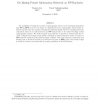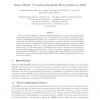108
click to vote
TCC
2016
Springer
9 years 9 months ago
2016
Springer
G¨o¨os, Pitassi and Watson (ITCS, 2015) have recently introduced the notion of Zero-Information Arthur-Merlin Protocols (ZAM). In this model, which can be viewed as a private ve...
TCC
2016
Springer
9 years 9 months ago
2016
Springer
TCC
2016
Springer
9 years 9 months ago
2016
Springer
We show the following reductions from the learning with errors problem (LWE) to the learning with rounding problem (LWR): (1) Learning the secret and (2) distinguishing samples fro...
TCC
2016
Springer
9 years 9 months ago
2016
Springer
Secret sharing is a mechanism by which a trusted dealer holding a secret “splits” the secret into many “shares” and distributes the shares to a collection of parties. Asso...
TCC
2016
Springer
9 years 9 months ago
2016
Springer
TCC
2016
Springer
9 years 9 months ago
2016
Springer
TCC
2016
Springer
9 years 9 months ago
2016
Springer
TCC
2016
Springer
9 years 9 months ago
2016
Springer
We propose a new cryptographic primitive called witness pseudorandom functions (witness PRFs). Witness PRFs are related to witness encryption, but appear strictly stronger: we sho...
TCC
2016
Springer
9 years 9 months ago
2016
Springer
Abstract. Error correcting codes, though powerful, are only applicable in scenarios where the adversarial channel does not introduce “too many” errors into the codewords. Yet, ...
TCC
2016
Springer
9 years 9 months ago
2016
Springer
We present Onion ORAM, an Oblivious RAM (ORAM) with constant worst-case bandwidth blowup that leverages poly-logarithmic server computation to circumvent the logarithmic lower bou...


